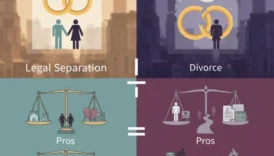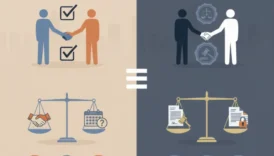Will vs Trust: Which One Should You Choose?

When it comes to estate planning, two of the most common tools people consider are wills and trusts. Both serve the purpose of managing and distributing your assets, but they work in very different ways. A will is a legal document that outlines your wishes for property distribution and guardianship after death, while a trust creates a legal arrangement that allows a trustee to hold and manage assets for beneficiaries, often avoiding probate. Choosing between a will and a trust depends on factors like your financial situation, privacy concerns, and long-term goals. Understanding the distinctions helps you make the right choice for protecting your legacy and your loved ones.
What Is a Will and How Does It Work?
A will is one of the most common and fundamental estate planning tools. Legally referred to as a last will and testament, it is a written document that states how you want your property, assets, and personal responsibilities to be handled after your death. Wills are widely recognized across jurisdictions and can be tailored to meet individual needs, but they must meet certain legal requirements to be valid.
Core Functions of a Will
- Asset Distribution: Specifies who inherits property, money, or personal belongings.
- Guardianship of Minors: Allows parents to designate guardians for their children, ensuring custody does not default to the state.
- Executor Appointment: Names an executor (sometimes called a personal representative) who is responsible for carrying out the terms of the will.
- Debt and Tax Handling: Provides instructions on how debts and taxes should be settled before assets are distributed.
Legal Requirements
For a will to be legally valid, most jurisdictions require:
- Legal Capacity: The testator (person making the will) must be of sound mind and of legal age.
- Written Document: Oral wills are rarely valid; a written document is required.
- Signatures: The testator must sign the will, often in the presence of witnesses.
- Witnesses: Typically two disinterested witnesses are needed to confirm the validity.
Limitations of a Will
- Probate Requirement: A will usually must go through probate, a court-supervised process that validates the will and oversees distribution. This can be time-consuming and costly.
- Public Record: Once probated, a will becomes part of the public record, which reduces privacy.
- Limited Control After Death: Unlike a trust, a will doesn’t provide for management of assets during your lifetime or detailed conditions after distribution.
Example Scenario
A parent creates a will naming their spouse as executor, their children as beneficiaries, and a trusted friend as guardian for their minor child. Upon their passing, the court validates the will through probate, and the executor distributes the estate accordingly.
Why Wills Are Important
Wills are relatively simple and inexpensive to create, making them accessible for most individuals. Even those with modest estates benefit from having one, as it prevents state intestacy laws (which decide inheritance when no will exists) from determining asset distribution.
What Is a Trust and How Does It Work?
A trust is a legal arrangement that allows a person (the grantor or settlor) to transfer assets to a separate legal entity, which is then managed by a trustee for the benefit of one or more beneficiaries. Unlike a will, which only takes effect upon death, a trust can become effective immediately and often continues to operate long after the grantor has passed away.
Core Functions of a Trust
- Asset Management: The trustee manages the assets according to the terms set by the grantor.
- Avoidance of Probate: Assets in a trust typically bypass the probate process, allowing for faster and more private distribution.
- Ongoing Control: A trust can specify detailed conditions, such as releasing funds for a child’s education or restricting distributions until a beneficiary reaches a certain age.
- Protection of Assets: Trusts can shield assets from creditors, lawsuits, or mismanagement by beneficiaries.
Types of Trusts
- Revocable Living Trust:
- Can be changed or revoked by the grantor during their lifetime.
- Assets remain under the grantor’s control but pass smoothly to beneficiaries upon death.
- Irrevocable Trust:
- Cannot be altered once established.
- Provides stronger asset protection and estate tax benefits.
- Specialized Trusts:
- Charitable trusts, special needs trusts, and spendthrift trusts serve unique purposes tailored to specific goals.
Legal Requirements
- Trust Document: A written agreement establishing the trust, naming the trustee, and defining the beneficiaries.
- Transfer of Assets: The grantor must properly transfer ownership of assets (e.g., deeds, bank accounts) into the trust.
- Trustee Acceptance: The trustee must agree to manage the trust according to its terms.
Limitations of a Trust
- Cost and Complexity: Setting up a trust is more expensive and time-consuming than writing a will.
- Maintenance: Assets must be actively placed into the trust (“funded”), or they may still pass through probate.
- Not Always Necessary: For smaller estates, the costs of creating a trust may outweigh the benefits.
Example Scenario
A couple establishes a revocable living trust to ensure their assets pass directly to their children without probate. They appoint a trusted family member as trustee, who will manage the estate and release funds for education and healthcare until the children reach adulthood.
Why Trusts Are Important
Trusts offer greater flexibility, control, and privacy than wills. They are particularly useful for families with significant assets, minor children, or specific conditions for inheritance. While not everyone needs a trust, for many, it is a powerful estate planning tool.
Key Differences Between Wills and Trusts
While both wills and trusts are estate planning tools, they function very differently. Understanding the core differences between them helps individuals decide which option best fits their personal and financial circumstances.
Timing of Effect
- Will: Only takes effect after the death of the testator. Until then, it has no legal impact.
- Trust: Can take effect during the grantor’s lifetime (living trust) and continue after death.
Probate Process
- Will: Must go through probate, which is a court-supervised process that validates the will and oversees distribution. This process can be lengthy, costly, and public.
- Trust: Usually avoids probate, allowing assets to pass directly to beneficiaries with greater privacy and speed.
Privacy Considerations
- Will: Becomes a matter of public record once probated, meaning anyone can review its contents.
- Trust: Remains private. Only the trustee and beneficiaries typically know the details.
Asset Control
- Will: Distributes assets outright upon death, offering little long-term control.
- Trust: Allows the grantor to set conditions for distribution, such as age limits or specific purposes like education.
Costs and Complexity
- Will: Less expensive and simpler to create. Often sufficient for modest estates.
- Trust: More expensive and complex to establish and maintain, but provides broader benefits for larger or more complicated estates.
Guardianship and Minor Children
- Will: The only legal tool that allows parents to appoint guardians for minor children.
- Trust: Can manage assets for children but cannot appoint guardianship.
Table: Wills vs. Trusts at a Glance
| Feature | Will | Trust |
|---|---|---|
| Effective Date | After death | During life or after death |
| Probate Required | Yes | Usually no |
| Privacy | Public record after probate | Remains private |
| Control of Assets | Simple distribution | Conditional and long-term control |
| Cost | Lower setup cost | Higher setup and maintenance cost |
| Guardianship | Can appoint guardians for children | Cannot assign guardianship |
Example Scenario
- A single parent with modest assets might rely on a will to distribute property and appoint a guardian for their child.
- A wealthy couple with multiple real estate holdings may prefer a trust to avoid probate, protect privacy, and control how their estate is distributed over decades.
Why the Distinction Matters
These differences highlight why wills and trusts are not interchangeable but rather complementary tools. The right choice depends on goals, complexity of assets, and family needs.
Advantages of Using a Will
Although wills are often considered the more “basic” estate planning tool, they come with several important advantages that make them the right choice for many individuals. For people with relatively simple estates or straightforward family structures, a will can provide everything needed to ensure property is distributed according to their wishes.
1. Simplicity and Accessibility
- Wills are generally much easier and less expensive to create than trusts.
- They don’t require complex legal structures, funding of assets, or ongoing management.
- For many families, drafting a will through an attorney or even using state-approved forms is sufficient.
2. Appointment of Guardianship
- One of the most critical benefits of a will is the ability to appoint guardians for minor children.
- This ensures that children are cared for by the people you trust, rather than leaving the decision up to the courts.
- Trusts cannot provide this feature, making wills essential for parents.
3. Comprehensive Asset Distribution
- Wills allow you to specify who inherits what, covering both real estate and personal belongings.
- They can also handle digital assets, such as online accounts or intellectual property, depending on jurisdiction.
- Without a will, the state’s intestacy laws determine distribution, which may not reflect your preferences.
4. Flexibility
- Wills can be easily updated or amended through codicils or by creating a new will.
- Life events such as marriage, divorce, or the birth of a child can be reflected quickly.
5. Clarity for Family Members
- A will provides clear instructions, reducing confusion or disputes among family members after death.
- Even if contested, having a written document makes the court’s job easier compared to no instructions at all.
Example Scenario
A single parent with a modest estate uses a will to:
- Leave their home to their child.
- Appoint their sibling as guardian.
- Designate a trusted friend as executor.
This ensures a smooth transfer of responsibilities and assets without leaving important decisions to the courts.
Limitations Acknowledged
While wills are beneficial, they do not avoid probate, and they lack the privacy and asset control that trusts offer. Still, their simplicity and guardianship function make them indispensable for many families.
Advantages of Setting Up a Trust
Trusts are often seen as the more sophisticated estate planning tool compared to wills. While they require more effort and cost to establish, the benefits they provide can be substantial, especially for individuals with complex estates, significant assets, or unique family circumstances.
1. Avoidance of Probate
- Perhaps the most significant advantage of a trust is that it bypasses the probate process.
- Probate can take months or even years, adding costs and delaying asset distribution.
- With a properly funded trust, beneficiaries can access assets much more quickly and privately.
2. Greater Privacy
- Unlike wills, which become public record after probate, trusts remain confidential documents.
- This protects sensitive information about your assets and beneficiaries from public scrutiny.
3. Ongoing Asset Control
- Trusts allow grantors to set detailed conditions for how assets are distributed.
- For example, a parent can require that children only receive funds for education or after reaching a certain age.
- This ensures wealth is managed responsibly over time.
4. Protection from Creditors and Legal Claims
- Certain types of trusts, such as irrevocable trusts, provide strong protection against creditors, lawsuits, or claims from outside parties.
- This makes them particularly useful for individuals in high-risk professions or with large estates.
5. Flexibility with Revocable Trusts
- A revocable living trust can be altered or revoked during the grantor’s lifetime.
- This flexibility allows individuals to adjust their plans as family and financial situations evolve.
6. Support for Special Needs Beneficiaries
- Specialized trusts, like special needs trusts, protect vulnerable beneficiaries by providing financial support without affecting government benefits eligibility.
7. Smooth Management in Case of Incapacity
- Unlike wills, which only operate after death, trusts can take effect during the grantor’s lifetime.
- If the grantor becomes incapacitated, the trustee can immediately manage assets without requiring a court-appointed guardian.
Example Scenario
A married couple with significant real estate holdings establishes a revocable living trust. They stipulate that their children receive staggered payments at ages 25, 30, and 35. This allows for controlled asset management, avoids probate, and ensures long-term financial stability for their heirs.
Bottom Line
Trusts are particularly valuable for those who want more control, protection, and privacy. While more costly to set up, they often save beneficiaries time, money, and stress in the long run.
Costs and Complexity: Wills vs. Trusts
One of the most practical considerations in estate planning is the cost and complexity involved in setting up and maintaining wills versus trusts. While both documents require careful planning, the level of investment in time, money, and legal resources differs significantly.
Costs of a Will
- Initial Setup:
- Wills are generally the least expensive estate planning option.
- Depending on the jurisdiction and complexity, drafting a will can cost anywhere from $150 to $1,000 with an attorney, or even less if using standard templates or online services.
- Maintenance:
- Updating a will is relatively simple and inexpensive, often requiring only a new version or an amendment (codicil).
- Probate Costs:
- While cheaper upfront, wills can lead to higher costs after death, as probate fees, court costs, and attorney fees may reduce the estate’s value.
Costs of a Trust
- Initial Setup:
- Trusts are more complex and costlier to establish, often ranging from $1,000 to $3,000 (or more for complex estates).
- Drafting requires detailed legal documents to establish terms, designate trustees, and transfer ownership of assets.
- Funding the Trust:
- Assets must be formally transferred into the trust (e.g., changing property titles, bank account registrations), which adds administrative time and potential costs.
- Maintenance:
- Trusts may require ongoing management and adjustments, especially if they are revocable or hold diverse assets.
Complexity Comparison
- Wills:
- Straightforward and easier to understand.
- Typically involve fewer administrative steps until probate.
- Trusts:
- Require more upfront planning, documentation, and asset management.
- Trustees must follow legal obligations, keep records, and manage assets responsibly.
Table: Costs and Complexity at a Glance
| Factor | Will | Trust |
|---|---|---|
| Initial Cost | Low ($150–$1,000) | Higher ($1,000–$3,000+) |
| Ongoing Management | Minimal | Moderate to High |
| Probate Fees | Yes (can be expensive) | No (avoids probate) |
| Ease of Setup | Simple | Complex, requires funding process |
| Legal Guidance | Helpful but not always needed | Almost always necessary |
Example Scenario
- A young professional with limited assets may opt for a will, saving upfront costs while ensuring their wishes are respected.
- A business owner with multiple properties might choose a trust, despite higher setup costs, to avoid expensive probate and keep matters private.
Key Insight
While wills are cheaper and simpler to create, trusts often prove more cost-effective in the long run, especially for larger or more complex estates. The choice depends largely on financial resources and estate planning goals.
Privacy and Probate Considerations
When deciding between a will and a trust, one of the most critical factors is how each handles probate and privacy. These two aspects can significantly impact the speed, cost, and exposure of your estate after death.
The Probate Process
- What Is Probate?
Probate is the court-supervised process of validating a will, settling debts, and distributing assets. While designed to protect fairness, it can be time-consuming, expensive, and public. - How It Works with Wills:
- Wills must go through probate.
- This process may take several months to years, depending on the complexity of the estate and whether disputes arise.
- Probate costs often include court filing fees, executor’s commissions, and attorney fees.
- How It Works with Trusts:
- Trusts typically bypass probate because assets are already owned by the trust, not the individual.
- This allows assets to transfer directly to beneficiaries with minimal court involvement.
Privacy Implications
- Wills and Public Record:
- Once admitted to probate, wills become part of the public record.
- This means anyone can access details about your assets, beneficiaries, and even debts.
- For families with sensitive financial matters, this lack of privacy can be problematic.
- Trusts and Confidentiality:
- Trusts remain private documents, accessible only to trustees and beneficiaries.
- This protects family matters, asset details, and inheritance plans from public view.
Why Privacy and Probate Matter
- Time Efficiency: Trusts allow for faster distribution of assets, often avoiding delays that families experience during probate.
- Cost Savings: Avoiding probate can save thousands in legal fees and court expenses.
- Reduced Conflict: Public probate records may encourage disputes among extended family or creditors. Trusts reduce that risk by limiting access to sensitive details.
- Discretion for High-Profile Families: Privacy is particularly valuable for wealthy or high-profile individuals who prefer to keep estate matters confidential.
Example Scenario
- Will: An entrepreneur dies leaving only a will. During probate, creditors and even distant relatives discover the estate’s details, leading to disputes and delays.
- Trust: Another entrepreneur places assets in a living trust. After death, the trustee distributes assets privately and efficiently, avoiding probate entirely.
Key Insight
If privacy and avoiding lengthy legal processes are top priorities, a trust is generally the better choice. However, if simplicity and lower upfront costs are more important, a will may be sufficient despite probate.
Which Option Is Better for Families with Children?
Families with children—especially minors—face unique estate planning considerations. The decision between a will and a trust depends on whether the focus is on appointing guardians, managing assets for minors, or providing long-term financial security.
Wills for Families with Children
- Guardianship Designation:
- A will is the only legal tool that allows parents to designate a guardian for their minor children.
- Without a will, the court decides who will raise the children, which may not align with the parents’ wishes.
- Asset Distribution:
- A will can name children as beneficiaries, ensuring they inherit property.
- However, if children are minors, the court may appoint a custodian or guardian to manage assets until adulthood.
- Simplicity:
- Wills are straightforward and affordable, making them accessible for young families.
Trusts for Families with Children
- Asset Management for Minors:
- A trust allows parents to set conditions for how and when children receive their inheritance.
- For example, distributions can be delayed until the child turns 25, or restricted to education and healthcare expenses.
- Avoiding Probate Delays:
- Since trusts bypass probate, assets can be accessed more quickly, ensuring children’s financial needs are met without long legal processes.
- Ongoing Financial Support:
- Trustees can manage investments, pay bills, and handle complex financial matters until children are ready to take over.
Practical Comparison
| Feature | Will | Trust |
|---|---|---|
| Guardianship of Minors | ✅ Yes (only through a will) | ❌ Not possible |
| Control of Inheritance | ❌ Limited (court oversight needed) | ✅ Full control with tailored rules |
| Probate Impact | ❌ Assets delayed until probate ends | ✅ Immediate access for children |
| Cost for Parents | ✅ Lower upfront cost | ❌ Higher but more protective |
Example Scenario
A couple with two young children drafts a will to appoint guardians but also sets up a living trust. The will ensures the children have legal guardians, while the trust ensures inheritance is managed responsibly until adulthood. This combined approach provides both security and financial stability.
Key Insight
- Families with minor children need at least a will to designate guardianship.
- A trust is ideal for managing assets and providing structured, long-term financial support.
- In many cases, the best solution is to use both a will and a trust together.
When to Use Both a Will and a Trust Together
Many people mistakenly believe they must choose either a will or a trust, but in reality, the most effective estate plans often use both tools together. Wills and trusts complement each other, addressing different needs and closing gaps that either document might leave open if used alone.
Why Combine a Will and a Trust?
- Guardianship and Asset Management:
- A will is essential for appointing guardians for minor children, something a trust cannot do.
- A trust, on the other hand, ensures assets are managed and distributed responsibly.
- Covering All Assets:
- Even if most assets are placed in a trust, some property may be overlooked or acquired later. A “pour-over will” ensures those assets transfer into the trust after death.
- Flexibility and Control:
- Wills provide a simple structure for basic instructions, while trusts allow for ongoing management and conditions.
- Backup Protection:
- If the trust is not properly funded, the will serves as a safety net to ensure assets are distributed according to the estate plan.
Example of a Combined Approach
- Will Functions:
- Appoint guardians for children.
- Outline funeral or burial wishes.
- Serve as a catch-all for assets not included in the trust.
- Trust Functions:
- Avoid probate.
- Maintain privacy.
- Distribute assets under specific conditions, such as age or educational milestones.
Benefits of Using Both
- Comprehensive Coverage: Every legal need is addressed—guardianship, asset transfer, probate avoidance, and long-term planning.
- Reduced Risk: Prevents gaps in the estate plan that could lead to disputes or court involvement.
- Tailored Solutions: Allows families to customize arrangements for both practical and financial goals.
Example Scenario
A couple establishes a revocable living trust for their home, investments, and life insurance. At the same time, they draft a simple will naming guardians for their minor children and creating a pour-over provision to move any leftover assets into the trust. This ensures that all areas—parental responsibility, asset protection, and privacy—are covered.
Key Insight
For many families, the best choice is not one or the other but a strategic combination of wills and trusts. Together, they create a complete, flexible, and secure estate plan.
Final Thoughts: Choosing the Right Estate Planning Tool
Deciding between a will and a trust—or using both together—ultimately comes down to your personal circumstances, financial situation, and long-term goals. While both documents aim to protect your loved ones and ensure your wishes are carried out, they approach estate planning from different angles.
When a Will May Be Sufficient
- You have a modest estate with relatively simple assets.
- Your main priority is to name guardians for minor children.
- You want a low-cost, straightforward option for ensuring your property passes to beneficiaries.
- You don’t mind probate or the public nature of the process.
When a Trust Is the Better Choice
- You want to avoid probate and the delays, costs, and publicity that come with it.
- You have substantial assets or complex holdings (e.g., multiple properties, business interests).
- You wish to control asset distribution with conditions, such as staggered payments or educational funds.
- You want to protect assets from creditors, lawsuits, or poor money management by heirs.
When to Use Both Together
- Families with children often benefit from having both: a will to appoint guardians and a trust to manage financial resources.
- A pour-over will can catch assets not placed into the trust, ensuring a complete plan.
- This combined strategy balances simplicity, flexibility, and control.
Practical Tip
Estate planning is not one-size-fits-all. It’s important to:
- Assess your goals: Do you prioritize privacy, cost-efficiency, or control?
- Evaluate your estate size: Larger and more complex estates generally benefit from trusts.
- Consult a professional: Estate attorneys can recommend tailored strategies based on your state laws and family dynamics.
Closing Perspective
Whether you choose a will, a trust, or both, the most important step is to have an estate plan in place. Without one, state intestacy laws decide who inherits your assets and who cares for your children, which may not reflect your wishes. By thoughtfully selecting the right tools, you can provide clarity, reduce stress for your loved ones, and safeguard your legacy.
Frequently Asked Questions (FAQs)
1. Do I need both a will and a trust?
Not always. A will may be sufficient for simple estates, while a trust provides added benefits like probate avoidance and asset control. Many families choose to use both for comprehensive coverage.
2. Does a trust completely replace a will?
No. A trust manages assets placed in it, but a will is still necessary for guardianship of minor children and for transferring any assets not included in the trust.
3. Which is cheaper: a will or a trust?
A will is cheaper to create initially, often costing a few hundred dollars. A trust can cost several thousand to set up, but may save money in the long run by avoiding probate.
4. Can I make changes to my will or trust?
Yes. Wills can be updated through codicils or by drafting a new will. Revocable trusts can be modified or revoked during your lifetime. Irrevocable trusts, however, cannot be easily changed.
5. Do wills and trusts affect taxes?
Wills alone don’t provide tax benefits, but certain types of trusts can reduce estate taxes and protect assets from creditors.
6. What happens if I die without a will or trust?
Your estate will be distributed under state intestacy laws, which may not align with your wishes. Courts will also decide guardianship for minor children.
7. Are wills and trusts public?
Wills become public record after probate, meaning anyone can see the details. Trusts remain private documents, accessible only to trustees and beneficiaries.
8. Do trusts protect assets from creditors?
Some trusts, especially irrevocable ones, can shield assets from creditors, lawsuits, or claims, while revocable living trusts generally do not offer this protection.
9. Which is faster for asset distribution: a will or a trust?
Trusts typically allow faster transfer of assets since they bypass probate, while wills may take months or years depending on probate delays.
10. Should I consult an attorney for estate planning?
Yes. While online forms exist, consulting an estate planning attorney ensures your documents comply with state laws and fully protect your interests.






